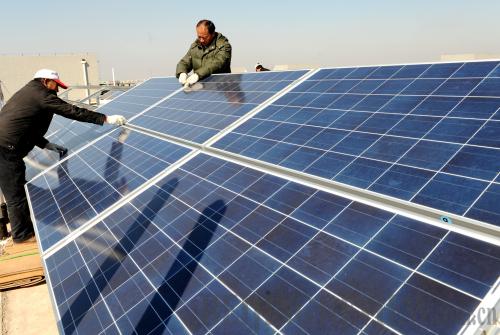|
 |
|
NEW ENERGY: Workers are building the first photovoltaic power station in Lianyungang, Jiangsu Province (GENG YUHE) |
Jiangsu Province had the limelight at the Fourth Session of the 11th National People's Congress (NPC) held on March 5-14 as the east coastal province launches a bold campaign to raise the income of its residents.
The ambitious goal is to double the income of its residents in seven years and help those with an annual income below 2,500 yuan ($385) escape poverty within 2011, said Luo Zhijun, Deputy to the 11th NPC and Secretary of the CPC Jiangsu Provincial Committee.
"To achieve these goals, we have to maintain at least a 10-percent growth rate annually in residents' income," he said.
The disposable income of urban residents in Jiangsu was 22,944 yuan ($3,529.8) in 2010, rising 86 percent from 2005. Meanwhile, the net income of farmers surged 77 percent in the past five years to hit 9,118 yuan ($1,402.8).
With its turbo-charged manufacturing machines roaring along, Jiangsu's economy has been bursting with vitality. The east coastal province, which accounts for only about 1 percent of the country's total area, is home to many of the world's leading exporters of electronic equipment, chemicals and textiles.
In February 2011, the Chinese Academy of Social Sciences released its Annual Report on the Overall Competitiveness of China's Provincial Economies (2009-10), putting Jiangsu in third place for two consecutive years, only behind Shanghai and Beijing.
Jiangsu was not spared the ripple effects of the financial crisis, but was quick to recover as the province diversified into more innovative industries like wind power and software services. The growth prospects there were so appealing that global investors flocked to cash in on the economic boom. Its accrued foreign direct investment amounted to $28.5 billion in 2010, more than any other province and accounting for nearly 30 percent of the country's total.
The solid economic foundation has allowed the province to significantly bolster people's lives, though pressures remain, said Luo. It is necessary to ensure that the residents' income growth keeps pace with economic development, he said.
Efforts will be strengthened to accelerate wage growth of employees, expand wealth of needy farmers and repair the social safety net, he added.
Of those three tasks, quickening wage growth of employees may be the most difficult, said Wu Keli, Deputy Director of the Jiangsu Provincial Department of Labor and Social Security.
On February 1, 2011, the province raised the minimum wage standard by more than 18 percent in a move to boost compensation for low-income earners.
While it came as good news for employees, the new policy seems to have put many employers, especially small and medium-sized enterprises, on a tight spot, said Wu.
There is therefore growing need for the government to cushion the impact with greater support to smaller businesses, he said.
"Policymakers are supposed to create a favorable policy environment for people to start up their own businesses and make a fortune," he said. "This would also help shore up the private economy and provide more job opportunities."
Definitive actions
As it gears up to bring more tangible benefits to needy groups, Jiangsu is backing up its pledge.
This year the province plans to raise the minimum subsistence security standard for farmers in north Jiangsu to 210 yuan ($32.3) from 155 yuan ($23.8) per month in 2010. The annual subsidy for basic medical insurance of urban residents will increase to 200 yuan ($30.8) from 120 yuan ($18.5) last year. In addition, Jiangsu will build 2,000 pension service centers across the province, extending a helping hand to the homeless seniors.
Soaring property prices have put homes beyond the reach of many working-class families. Attempting to tackle these concerns, the province plans to build 150,000 public rental apartments and repair 200,000 dilapidated houses this year. The long-term goal is to expand the affordable housing program to cover 20 percent of households in the next five years.
| 